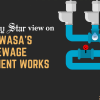Is Dhaka Wasa personal property after all?

Prof Sujit Kumar Bala has been appointed the new chairman of the Dhaka Water Supply and Sewerage Authority (Wasa) board. According to a circular issued on May 22, he succeeded former Dhaka Wasa chairman Dr Golam Mostafa, who, two days prior to being substituted, had alleged that Wasa had become the "personal property" of its managing director, Taqsem A Khan.
One would've hoped that the chairman's allegations would have been investigated with due diligence. Instead, he was sacked for speaking up. Needless to say, the move further explicates the disastrous depth of corruption in the organisation and the untouchable position of the Wasa MD. Reports after reports have provided evidence of the MD's wrongdoings, yet nothing has been done to hold him accountable. Even allegations from the chairman couldn't deliver a much-needed shake-up. So, the question is: what reasons do we have to believe that Wasa is anything but the MD's personal property?
Taqsem has been accused of various misdeeds over the years, including being selected and reappointed as the MD for six consecutive terms, in violation of Wasa's bylaws. His reappointments were deemed "questionable" by Transparency International Bangladesh (TIB), which also demanded a neutral audit of his performance. The audit is yet to be held.
During Taqsem's leadership, Dhaka Wasa hasn't been able to fix the city's waterlogging issue, in addition to failing to provide safe water to its customers. Given Wasa's repeated failure to resolve the issue of waterlogging, Dhaka's two city corporations took over drainage management in 2020. Additionally, it was discovered that the Buriganga River was polluted by Wasa's sewage systems.
The organisation has consistently refused to answer for its shortcomings, despite the fact that it has completely failed to enhance the quality of water it distributes to inhabitants (for instance, last year, the city had a significant cholera epidemic as a result of leaks in Wasa pipes). According to a TIB investigation, 62 percent of those who applied for water and sewer connections from Wasa said they encountered harassment and anomalies.
If dodging accountability, transparency, and governance were an art, either Wasa or its MD would've been maestros. Around 910 million litres of sewage are reportedly generated every day in the areas covered by Wasa. Of this, almost 900 million litres of raw sewage enter our freshwater sources, such as rivers and canals – meaning less than two percent of the sewage is being treated. In May, the National River Conservation Commission's chairman accused Dhaka Wasa of contaminating the rivers that surround the capital. No data can quantify the immense damage done to our water bodies as a result of Wasa's negligent and immoral activities.
Residents paid Tk 1,066 crore between FY 2018-19 and FY 2020-21 for sewage treatment, a service that was barely provided. In FY 2021-2022, it was almost Tk 400 crore. Why, therefore, should citizens pay for a service that doesn't exist?
Despite all this, Wasa hiked water rates often and unfairly between 2009 and 2022, for up to 15 times. While the general public suffered, MD Taqsem's pay and Wasa's earnings skyrocketed. The Wasa MD has received Tk 5.8 crore in salary and other benefits for the past 13 years. Wasa said in a report that Tk 1.29 crore had been taken out for housing rent and renovations, income tax, and other expenses, leaving the MD with Tk 4.51 crore. His pay increased by Tk 1.75 lakh during the first two years of the Covid-19 pandemic, during which the water tariff was hiked twice. Taqsem currently earns Tk 6.15 lakh per month, an astounding 421 percent increase in 12 years. The Consumers Association of Bangladesh (CAB) was correct when it claimed that Dhaka Wasa's MD and its officials are the ones who genuinely profit from the regular increases in water tariffs.
In blatant violation of the Dhaka Wasa Act of 1996 and the Dhaka Wasa Service Rule of 2010, Wasa MD Taqsem A Khan allegedly appointed two people close to him by establishing two top posts, even though they had already retired in 2016. Since then, former Wasa engineers Abul Kashem and AKM Shahid Uddin have regularly been reappointed as consultants, advisers, directors, or deputy managing directors. Reportedly, either one of them takes over as acting MD whenever the Taqsem travels overseas. Nothing has been achieved in terms of combatting this, despite the Local Government Division's (LGD) request to terminate their positions and cease paying the individuals' salaries and benefits.
The list goes on and on. The letter from the former chairman said the agency has become "a den of corruption." There is no mystery around this. But the question is: will MD Taqsem and others involved in running this den ever be held accountable?
Muhammad Zayed Hossen Jubayer is majoring in Finance and Banking at Govt BM College, Barishal.

 For all latest news, follow The Daily Star's Google News channel.
For all latest news, follow The Daily Star's Google News channel. 








Comments